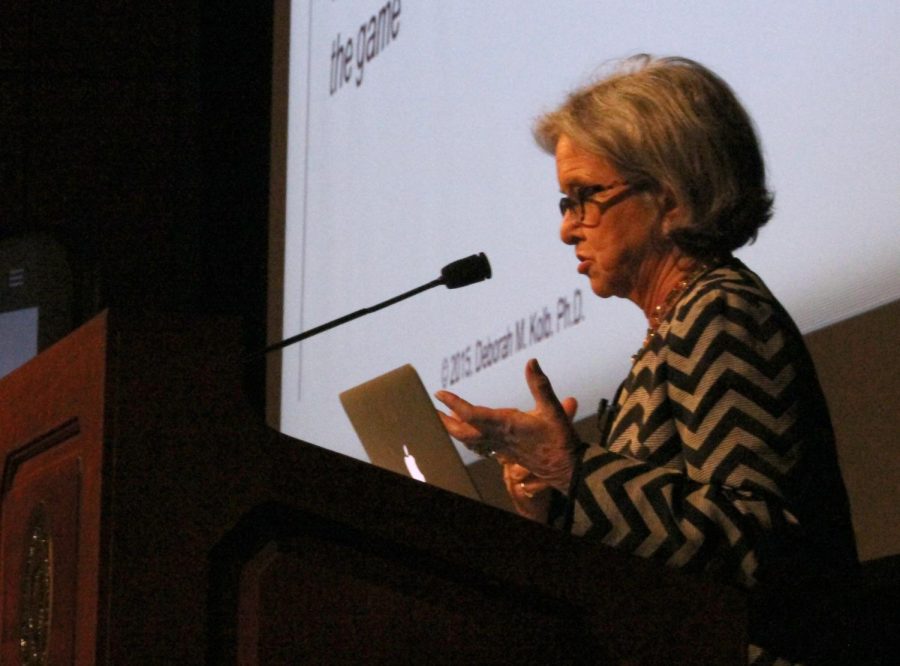Negotiation expert emphasizes importance of self-worth in the workplace
Dr. Deborah Kolb is co-director of negotiations in the workplace at Harvard Law School. She spoke at the Women in Business Conference in the Student Center Ballroom on Wednesday, Mar. 9, 2016.
March 9, 2016
Dr. Deborah Kolb, an authority on gender issues in negotiation and leadership, broke down the key factors of successful negotiation to an audience of 200 people during the sixth annual Spirit of Women in Business Conference, hosted by the College of Business Administration on Wednesday.
Kolb, co-director of the Negotiations in the Workplace Project under the Program on Negotiation at Harvard Law School, said a key factor in bringing negotiations to the table is knowing how to make your value visible.
“The problem is we don’t document our achievements. We have to find ways to document our achievements so when people negotiate with you, they understand your value,” Kolb said. “You have to do that on an ongoing basis, but you also have to think about your value in the moment.”
Another piece of getting people to the table is assessing your leverage and thinking about your alternatives and theirs to get to an agreement, Korb said.
“Try to think about what matters to you and what matters to them and try to find creative options that meet those interests,” Kolb said. “It’s always better to have more than one option because it makes it easier for you to say yes.”
Kolb said a key thing to remember when you are negotiating at work is to introduce alternatives in a way that doesn’t put people off. It’s important to know how to show your worth and make your value visible while maintaining humility.
“You have to have a way of saying your value in a way that doesn’t make you look like you’re extolling yourself,” Kolb said.
Kolb said although it may be trickier to find what your alternatives are when you are in a junior-level role, the same principles that apply for those in a senior-level role apply for those at a junior level.
“Come up with good solutions and good options,” Kolb said. “If you want something and they’re a little resistant, express that you have some ideas of how we could try it. Make it easy for them to say yes.”
Kolb said sometimes women are more likely to have to negotiate for opportunities in the workplace, as well as having to negotiate integrating work and personal life.
“A lot of times women are not considered for opportunities,” Kolb said. “Women want leadership roles, but when it comes time for an overseas assignment, the presumption is made that the women won’t take it, so therefore she has to negotiate for that opportunity. Performance doesn’t speak for itself. We have to negotiate for the things that we want.”
Kolb said one of the things research shows is that when you adopt a power pose before you go into a negotiation, you actually feel more powerful, people experience you as more powerful and you get better outcomes.
“When you negotiate for yourself, (negotiations) not only are good for you, they are actually small wins and creates a path for the people who come after you,” Kolb said.
Cathy Dubois, associate dean for Administration at the College of Business,said Kolb was chosen to be the keynote speaker because she has solid, research-based knowledge. DuBois said she hoped all those in attendance walked away from the speech with great ideas.
“There were some real tangible how-to’s that she gave everyone to take to their next negotiation,” DuBois said. “At the end of today’s conference, we want people to go back to their lives and their work and have great ideas to put in place right away.”
Chelsea Hytla, a senior managerial marketing major, said what resonated with her the most from Kolb’s speech was the idea of knowing your value and being able to present that in a way that you can get what you deserve.
“She was really good about talking about negotiating and women and trying to stand up for yourself and what you believe in,” Hytla said.
Caroline Licata is a College of Business reporter for the Kent Stater. Contact her at [email protected].

























